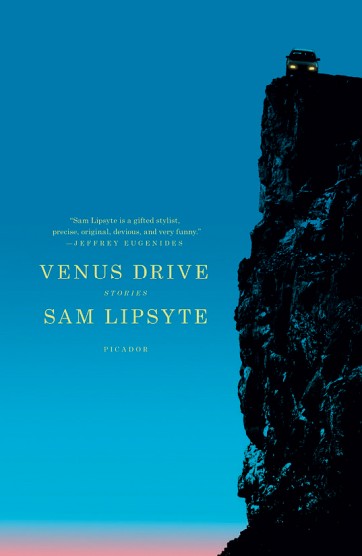Sometimes I like to think about what would happen if Sam Lipsyte and Miranda July had lunch together. Specifically, I like to imagine how long it would take them to get around to talking about peep shows and other dark obsessions, and how quickly they’d be cracking each other up. Who knows? Maybe they do have lunch together and talk only about burgeoning literary stardom.
I hope not.
Sam Lipsyte, for those who’ve not had the pleasure, is the author of several books. His first, Venus Drive, is a blackly brilliant collection of short stories. Discerning collectors of contemporary short stories ought to shelve it alongside Miranda July’s debut collection, No One Belongs Here More Than You.
What the two sets of stories share is a fascination with that mysterious territory where skeevy meets the sublime. Both collections feature characters that are emphatically not doing well. They aren’t doing well emotionally, spiritually, physically or mentally. They aren’t doing well financially, and you don’t even want to know how they’re doing romantically. But they are, goddamnit, not doing well with such style that the reader is left mesmerized by the magnificence of their failures.
Indeed, July, an independent filmmaker, whose most recent film is The Future, and Lipsyte, who went by the name “Sam Shit” when he was the lead singer of the Dung Beetle, seem to be bringing a whole new set of luggage to the short story convention. Both writers are tremendously funny. Lipsyte veers from the profane to the profound in the course of a sentence. July’s work sometimes hovers right at the edge of twee before she snaps the reader in the eye with some line that surprises as much as it hurts.

In July’s “The Swim Team”, the narrator tells an ex-boyfriend about the time she taught a group of elderly people to swim in a town with no pool or other bodies of water because she was surprised and delighted at their interest in her swimming career: “They seemed really, really interested in my story. I hadn’t even thought of it as a story before this, but now I could see that it is actually a very exciting story, full of drama and chlorine …” This narratorial epiphany quite accurately describes the body of July’s work, which is full of things you never knew you wanted to read about. In the course of this same short story, July’s narrator describes her coaching technique:
“I had three bowls of warm tap water lined up on the floor, and then a fourth bowl in front of those, the coach’s bowl. I added salt to the water because it’s supposed to be healthy to snort warm salt water, and I figured they would be snorting accidentally. I showed them how to put their noses and mouths in the water and how to take a breath to the side. Then we added the legs, and then the arms. I admitted these were not perfect conditions for learning to swim, but, I pointed out, this was how Olympic swimmers trained when there wasn’t a pool nearby. Yes yes yes, this was a lie, but we needed it because we were four people lying on the kitchen floor, kicking it loudly as if angry, as if furious, as if disappointed and frustrated and not afraid to show it. The connection to swimming had to be enforced with strong words.” The voice here, so sweet and loopy, is magic.
While July’s stories are often concerned with frank depictions of oddly unerotic sex, Lipsyte’s concern themselves more with intoxicants. Indeed, the characters in his first book are some of the least clean and sober to slouch across the page since Bukowski’s. Exclaims a character in “Less Tar”, “Me, I was pretty sure that without nicotine I’d be swinging from the shower nozzle in no time. You have to keep something between yourself and the truth of yourself or you’re dead, was how I figured it. Still do.” That’s a line with the ring of authenticity. Yet as devastated as most of Lipsyte’s characters are, they still seem capable of getting a kick out of things and other people, as well. To wit: “Now Rich walks in, a silver pin stuck in his lapel, his hair slicked back in the style of men who seem to be saying, Hey, go blow, my hair is slicked back, and on weekends I know joy.”
May we all wear our hair slicked back and know joy, if not from a hit of something illegal or from teaching the elderly how to land-swim then from the little awakenings provided by two master prose stylists.









